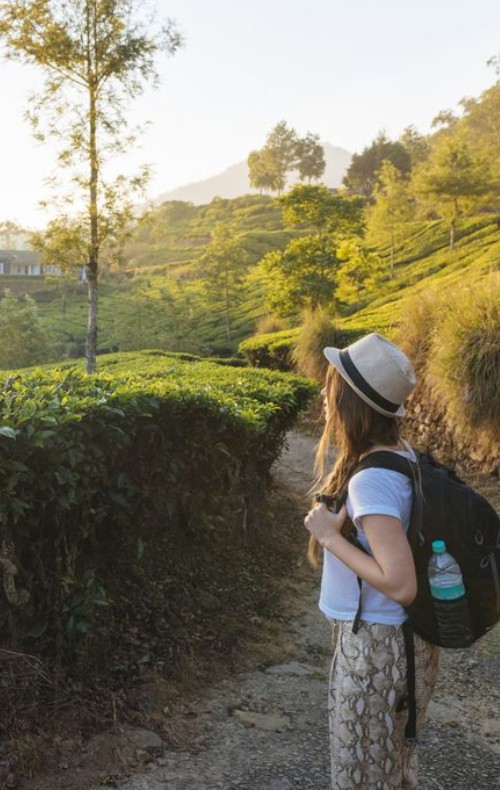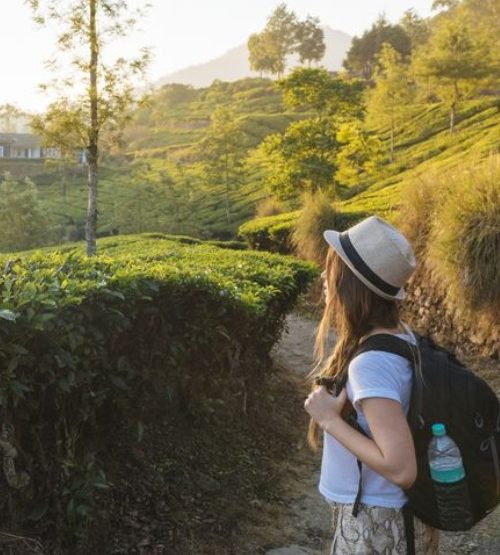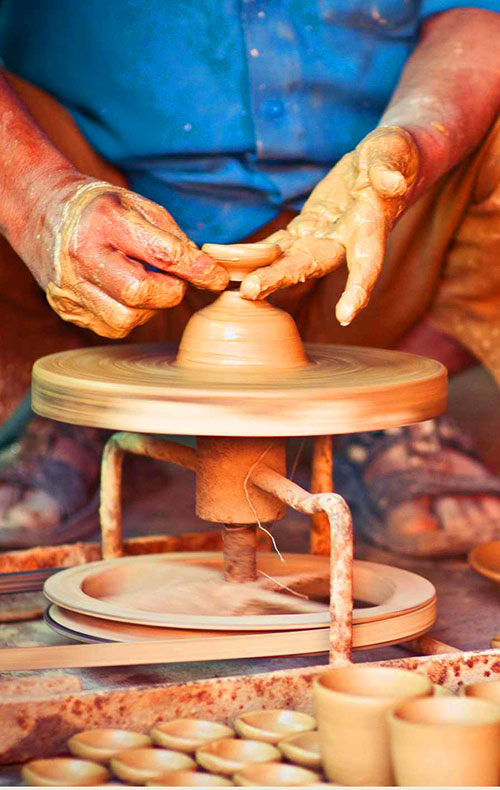Agriculture in India is as diverse as the country is. From the terrace farming of the Himalayas to desert farming of Rajasthan to coastal farming, and not to forget the great fertile Gangetic Plain encompassing several states as well as the fertile lands of Punjab and Haryana, India’s agricultural diversity is probably the most experiential and educating Agritourism landscape than anywhere else in the world.
Shikhar’s Agriculture Tour in India showcases not only the ways of the farmers and farming and traditional and modern Agricultural practices across varied landscape but also a heady unforgettable experience of India’s rural landscape and how it is evolving with time. It involves carefully planned study tours to various farms across several states, interactional with the local farmers, opportunity to indulge in farming practices, visits to Agriculture Research Institutes as well as opportunity to explore the historical landmarks, like the Taj Mahal, in Delhi, Agra and Jaipur.
Itinerary
Day 1 –ARRIVE DELHI
Arrive Delhi You will be meet by our representative outside the custom lounge and escorted till you check in at the hotel.
Delhi, the Empress of Indian cities has a fascinating history and a stimulating present. She has often been sacked and left naked and desolate. But she could not be despoiled of the incomparable situation that marks her for the metropolis of a Great Empire. The capital of India, Delhi has been the seat of power of a number of dynasties – the Rajputs, the Afghans, the Turks and the Mughals who continued their imperial line until the British. Scattered over are surviving ruins, remnants of mighty edifices, tombs of warriors and saints, which in an impressive sense of magnificence are memorials not of a single city but of supplanted nations
Overnight at the hotel.
Day 2 – DELHI
Morning after breakfast visit to Vegetable market of Delhi. As Indian economy is mainly based on Agriculture and 60% of farmers cultivating their fields while growing all kinds of grains and Vegetables in order to that farmers get the value of their products. The Government and private organizations have given space to carry out various activities. The aim is to ensure economic. legal and infrastructural conditions conducive to competitive marketing.
There are about 3664 Commission Agents/Wholesalers in regulated market & the purpose of regulation is to ensure orderly marketing to safeguard the interests of both producers/sellers and consumers by eliminating various malpractices like under-weighment, short payment, delayed payments, unauthorised deductions & indulgence of too many intermediaries.
Later combined City tour of Delhi visiting Old & New Delhi.
Drive past Red Fort, the 300-year-old walled city built by Emperor Shah Jehan in 1648 as his capital and named after him. The magnificent Red Fort built of red sandstone dates from the very peak of the Mughal power, Opposite the fort are the black and white onion dome and minarets of the Jama Masjid, the most elegant mosque in India. Visit Raj Ghat, where Mahatma Gandhi was cremated in 1948.
Also visit New Delhi the new capital designed by Sir Edward Lutyens. Drive past the Presidential Palace, the Rashtrapati Bhavan and the secretariat buildings – the center of all government activity and down the main avenue, the impressive Rajpath to the World War I memorial arch, the India Gate, the High Court Building and the Old Fort. Visit the Qutub Minar, 72 meters high and the ruins of Quwat-ul-Eslam (Light of Islam) Mosque. See Delhi’s most curious antique, the uncorroded Iron Pillar, which dates back to the 4th century AD.
Overnight at hotel.
Day 3 – DELHI-AGRA (210 km / 05 Hours)
Morning after breakfast leave Delhi for Agra. Photo stop at Sikandra. On arrival check-in at hotel. Later sightseeing of Agra will be provided visiting. Taj Mahal ( Closed on Fridays) where Tonga ride will be provided:Built in between (1631-1653), a poem in white marble, built by Shah Jahan in memory of his beloved wife, Mumtaj Mahal. As a tribute to a beautiful woman and as a monument for enduring love, the Taj reveals its subtleties when one visits it without being in a hurry. The dome is made of white marble, but the tomb is set against the plain across the river and it is this background that works its magic of colours that, through their reflection, change the view of the Taj. The colours change at different hours of the day and during different seasons. Like a jewel, the Taj sparkles in moonlight when the semi-precious stones inlaid into the white marble on the main mausoleum catch the glow of the moon.
Overnight at hotel.
Day 4 – AGRA
Morning after breakfast visit Agra Fort & Local School at Agra.
Education can potentially play a vital role in the country’s development as educated children are the key to a bright future.
Government reports indicate that 59 million children between 6-14 years do not attend school. Official information further indicates that just a little over one-third of all children who enroll in grade one reach grade eight. And this in a country which has made education for children in the age group 6-14 years a fundamental right.
Agra Fort :
Built alongside the Yamuna river stretching almost 2.5 km. The fort’s colossal double walls rise 20 m in height and measure 2.5 km in circumference. The fort is surrounded by a moat. The lofty battlements of the Agra fort cast its protective shadow over the far stretching mansions of nobles and princes built along the riverfront. The magnificent towers, bastions and ramparts and majestic gateways symbolized the confidence and power of the third Mughal emperor. The fort contains splendid palaces both in red sandstone and white marble built by two generations of prolific builders, Akbar and later on by Jahangir and Shahjahan. Of the nearly 500 Akbari buildings built in the Bengal and Gujarati traditions, only a few have survived, arrayed in a band on the riverfront
Later in the afternoon Visit Mother Teresa Home.
Overnight at hotel.
Day 5 –AGRA – FATEHPUR SIKRI – KARAULI
(185 km / 07 Hours)
Morning after breakfast leave Agra for Karauli enroute visits Fatehpur Sikri.
The abandoned red sandstone city built in the 16th century by the Mughal Emperor Akbar, one of India’s greatest rulers. Remarkably broadminded for his time, this Muslim king married a Rajput princess in order to win over his Hindu subjects. The architecture at Fatehpur Sikri is a combination of Hindu and Muslim styles, expressing Akbar’s vision of synthesizing the cultures.
Continue drive to Karauli. On arrival check in hotel.
Karauli is a holy city of Rajasthan, Situated 160 kms from Jaipur. Earlier called Kalyanpuri, after the local deity Kalyanji, Karauli was founded in 1348 AD. Karauli was strongly fortified by its rulers. The city is surrounded by a wall of red sandstone strengthened by bastions at several places. The peripheral wall, now dilapidated at several places, has six gates and eleven posterns.
Later in the afternoon camel cart ride will be provided to see the 600 year old city where one can see local handicraft shops like lacker work, bangle making, wooden toys, bamboo items, traditional sweets etc being made. Then go to see the 500 year old city palace full of frescos, fine stone carvings & paintings.
Before returning to the hotel guest can also visit the famous lord Krishna temple (Madan Mohan ji) which is in the city palace campus for evening arti.
Overnight at hotel.
Day 6 -KARAULI
Morning after breakfast visit around the campus to see the vintage cars, Organic dairy & Organic farming, Horses. Visit the campus charity school for poor family children and handicraft workshop run by N.G.O. Followed by cooking demonstration (Supplement given separately)
Cooking Demo / From Soil to the Plate – Cooking demo which is called from soil to the plate, where clients will be taken to farms and show them Dairy, poultry, Vermi-compost, inform them about organic agriculture, later they are taken to our kitchen garden. Also make them pluck the vegetables them selves, later they are given utensils and they cook Indian dishes, from the vegetables plucked under the supervision of hotel Chef.
Later in the afternoon Jeep safari ( 04 Persons in a Jeep) will be provided to visit the sanctuary Kaila Devi National park (Project tiger / Buffer zone to Ranthambore National Park) visit the villages living on natural habitat inside the sanctuary .On the way Visit the Kaila Devi goddess temple ad see the 200 bed hospital run by the temple trust.
(This is the only Project Tiger National Park In Rajasthan where these activities can be arranged)
Overnight at Hotel.
Day 7-Karauli – Jaipur (180 Km / 04 Hours)
Morning after breakfast leave Karauli for Jaipur. On arrival check in hotel.
Jaipur is where the enduring charisma of the past blends with the throbbing vitality of today. Where a colorful cast of characters – from printers and potters to artists and antique dealers – present a fascinating picture of a city that is alive to both tradition and change.
Raja Jai Singh, the founder of Jaipur was no ordinary man. He was a scholar and an astronomer, keenly sensitive to beauty, a formidable general, who tempered power with wisdom. In building Jaipur, Jai Singh’s vision took him beyond architectural beauty for in the sprawling, barren plains beneath Amber, the former capital, he gave India its first planned city, which has remained unique in two and a half centuries. Jai Singh made Jaipur a haven and it became a center of commerce and religion.
Afternoon City tour of Jaipur visiting the open-air royal observatory “Jantar Mantar”, with gigantic, astronomical instruments, the City Palace and Museum stopping by the “Hawa Mahal” or the Palace of Winds.
Late afternoon visit market area where cycle rickshaw ride will be provided.. Jaipur is a shopper’s delight offering a wide range of local handicrafts, vegetable dyed carpets with Persian designs, block printing with indigo and a variety of natural dyes, blue pottery, tie and dye fabrics and scarves. Jaipur is also famous for its gems and is a centre for the gem cutting industry.
Overnight at hotel.
Day 8- JAIPUR
Morning after breakfast visit to the Amber fort, the former seat of the Rajput rulers of Jaipur. Ascending the fortress seated on elephants (Subject to availability otherwise jeep ride will provided) wander around the beautiful palaces .
Afternoon visit Stud Farm
(Horse breading Farm) Jai Govind Stud today has come a long way from its small beginnings. It was set up by (Late) Th. Lt. Col. Govind Singh Khuri(VrC) after his retirement from the Indian Armed Forces in the early 80’s with three mares & one stallion on 20 Acres of land. That stallion was Thaumaturge (Thatch) who helped put the farm on the map thanks to his versatile progeny. He was the flag bearer for the farm and was joined by Formidable’s group winning juvenile Reasonable in the early 90’.
Evening witness the Aarti Ceremony in the famous Birla Temple.
Overnight at the hotel.
Day 9- JAIPUR
Morning after breakfast visit Cow Ashram (Gosala) where clients can see and feed the cows.In the ashram the cows are serviced with love and not raised for commercial purposes. The cows are services by the donation from the public. Cow is considered holy in India due this special care is taken for this animal. Group will be able to personally enjoy being there and also can see how so many cows are being kept.
Afternoon Visit Jaipur Dairy
Jaipur Dairy sells its milk & milk products through a network of over 4500 retail outlets spread over Jaipur city and near by 100 towns. The retailers are the most important segments of Jaipur Dairy and are given all care and attention. They are regularly trained on various aspects of Customer satisfaction. We have ensured that the consumer should not travel / walk more to fetch milk for his / her daily consumption. With this intention, strong networks of retail outlets have been made. Supply of liquid milk is made twice a day for benefit of the consumers. Liquid milk is dispatched to rural area through a contracted fleet of insulated vehicles. Jaipur Dairy was among the first 8 dairies to be selected by NDDB for countrywide launch of Mnemonic symbol campaign. Now we have shifted to our symbol to make our brand more prominent in Rajasthan.
Overnight at hotel.
Day 10- JAIPUR-DELHI(270 km / 06 hours)
Morning after breakfast leisurely leave Jaipur for Delhi. On arrival no hotel envisaged. Dinner will be provided in a City hotel where 02 rooms will be provided for wash and change. Later in time transfer to International airport to board flight for onward destinations leaving during early hours on Day 11.






